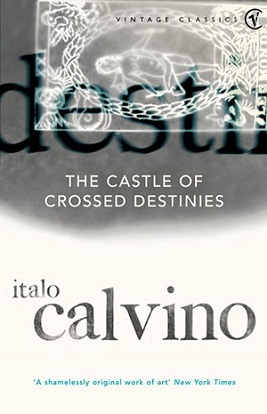I always get more reading done during vacations than any other time of the year. American English, Italian Chocolate was the first book I knocked off my TBR pile. The next one was The Castle of Crossed Destinies, which I started on the plane to Copenhagen and finished in the Hideout Cafe in Austin while I waited to meet my host and his girlfriend.

Author: Italo Calvino
My GoodReads rating: 2 stars
Average GoodReads rating: 3.54 stars
Language scaling: C1+
Plot summary: Weary travelers at a castle and a tavern are rendered unable to speak, and so use a Tarot deck to share their stories.
Recommended audience: Those interested in modernist literature; those interested in Tarot cards; fans of Italo Calvino.
In-depth thoughts: I picked The Castle of Crossed Destinies up for two reasons. First, the Tarot deck conceit seemed like it would be relevant for a current writing project of mine and I wanted to see how Calvino handled it. The second reason was my troubled relationship with Calvino. I hated Invisible Cities but loved If on a Winter’s Night a Traveler, so I wondered where on the spectrum this third book would fall. The answer is “somewhere in the middle,” so now I don’t know if Calvino is an author I hate, love, or am just apathetic about.
The Castle of Crossed Destinies is a contemporary version of something like The Decameron. There is no overarching plot or action; instead, it is a collection of fables and short stories. Some of them are original; some of them (if I understand Calvino’s epilogue properly) are myths and legends that he “retold” through a given sequence of Tarot cards. This isn’t what I was expecting or hoping for; I went in expecting something like Philip K. Dick’s Man in the High Castle, only with Tarot instead of I Ching and without the alternate history elements.
Putting that disappointment aside, I have to admit I didn’t really enjoy The Castle of Crossed Destinies. I didn’t hate it the way I hated Invisible Cities, but I didn’t like it nearly as much as If on a Winter’s Night a Traveler. I’m not glad that I’m read it, but I’m not annoyed, either.
